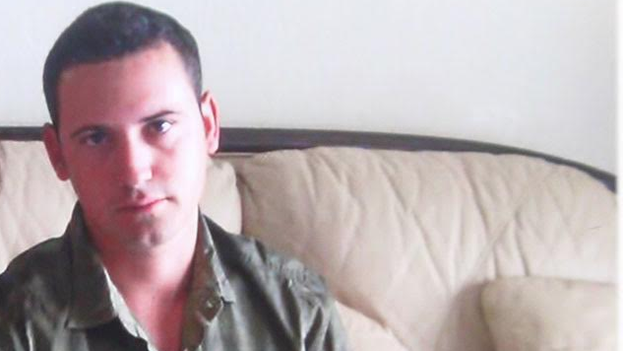
![]() 14ymedio, 29 February 2016 — José Ortega Amador, Obdulio Rodríguez González, Raibel Pacheco Santos and Félix Monzón Álvarez, accused of the crime of rebellion, were sentenced Wednesday to prison terms of between 10 and 15 years. Arrested in May 2014, the four men who were living in Miami before arriving on the island, were tried by a court in Havana, as reported to this newspaper by family members of the accused.
14ymedio, 29 February 2016 — José Ortega Amador, Obdulio Rodríguez González, Raibel Pacheco Santos and Félix Monzón Álvarez, accused of the crime of rebellion, were sentenced Wednesday to prison terms of between 10 and 15 years. Arrested in May 2014, the four men who were living in Miami before arriving on the island, were tried by a court in Havana, as reported to this newspaper by family members of the accused.
The case has been the subject of a great deal of talk during the 22 months between the arrest and trial of the four men. At the time, the Miami community and a large part of the Cuban people received the official information with skepticism and the news item quickly disappeared from the national media.
On 14 May 2014, the official newspaper Granma announced that the four citizens of Cuban origin “were arrested while planning to undertake terrorists actions in the national territory,” and were accused of “fomenting rebellion and attacking military units.” Those implicated had traveled to the island from “mid 2013” to “study and plan their execution,” according to the article.
However, it was only this week that the four men were brought to court. Although initially the Cuban authorities had suggested that they would be prosecuted for terrorism, the prosecution finally focused on an act of rebellion and “crimes against the internal security of the state.”
At the hearing, Pacheco acknowledged that he had come to the island to “stir up the people against the tyranny,” according to witnesses at the scene, but also said that he lacked the resources to do so. During the trial no evidence was presented of the possession of weapons, maps, or military sketches. Nor was there any talk of contacts with organizations of the internal opposition.
The defense lawyers brandished the concept of “impossible crime,” contained in Chapter 5 of the Cuban Penal Code in which it is established that if “the offense clearly could not have been committed, the court may freely mitigate punishment” and even exempt the accused “in a case of apparent absence of dangerousness.”
Pacheco Santos was sentenced to 15 years imprisonment, while the others involved were sentenced to 10 years in prison. A family source said “this is a ploy to trade them in negotiations with the United States before Obama comes.”
Granma, the official organ of the Communist Party explained that during their interrogation the accused had declared themselves to be “under the direction of the terrorists Santiago Álvarez Fernández Magriñá, Osvaldo Mitat and Manuel Alzugaray, who live in Miami and have close ties to the terrorist Luis Posada Carriles.”
In 2009, Pacheco, 33, registered a company in Florida under the name of Cuban Liberation Force Inc., and opened a digital page where the only content was a text that said the entity had created a “request for members of the Armed Forces to gather within Cuba,” and that their reason for being was “freedom and the overthrow of the regime to restore a system of rights.”
In Miami, Pacheco worked in a carpentry shop during the day and took economics classes at night at Florida International University, according to his family. His wife, Adriana Torres, a nurse and also a Cuban resident in Florida, has been able to visit him in prison and is currently three months pregnant.
The father of the accused, Segundo Manuel Pacheco Toledo, was rector of the University of Holguin for 11 years and a deputy in the National Assembly of People’s Power. Pacheco Toledano worked at the Embassy of Cuba in Mexico, from there he fled and crossed the US border in 2012. The family considers the sentence against his son to be government retaliation for the escape of the former official.
After the flight of his father, Pacheco stopped traveling to Cuba regularly. Before his arrest, he had flown to the island on 22 April 2009 and initially stated that the reason was to visit his paternal grandfather who was to undergo surgery. His mother, Nieves Santos Falcón, a prominent biologist who works at the School of Medicine at the University of Miami, has maintained the innocence of her son over the years.
In May 2014, and already in the midst of secret negotiations that would give rise to the restoration of relations between Cuba and the United States, delegations from both countries held a meeting on the arrest of the four men. “The Cubans provided some information about the allegations that we are now reviewing,” the State Department in a statement.
The closeness between the trial held this week and upcoming visit of United States President Barack Obama to Cuba nurtures the hope of the defendants and their families. “This is to fill the backpack of requests to US Secretary of State John Kerry,” suggested one those attending the trial. “I hope that he can see the birth of his child and return to his life in Miami,” added this relative of Pacheco, for whom “this has been a nightmare and someday the details will be known.”
